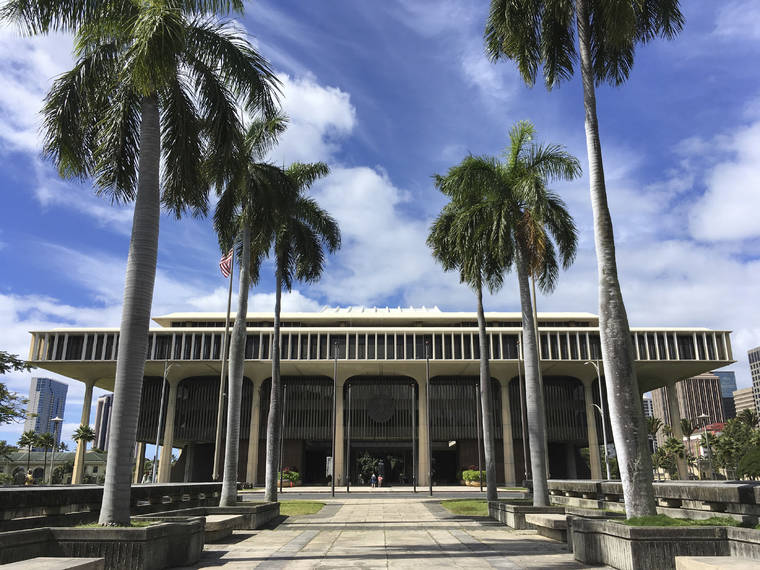Hawaii lawmakers consider nation’s highest income tax

ASSOCIATED PRESS / MARCH 1, 2019
The Hawaii state Senate is considering a bill that would impose a 16% tax on individuals earning more than $200,000, which would be the highest income tax rate of any state in the nation.
Hawaii is considering overtaking California as the state with the highest income tax rate in the nation, under legislation slated for a vote this week.
The Hawaii Senate was expected to vote Tuesday on legislation that would impose a 16% tax on individuals earning more than $200,000 a year, which would beat out California’s 13.3% on those earning more than $1 million.
Hawaii’s proposed new rate would also outstrip the largest combined local and state tax rate in the nation, paid by the highest income earners in New York City, which is currently 12.7%.
Hawaii has suffered a sharp decline in tax revenue as tourism has plummeted during the coronavirus pandemic, prompting lawmakers to search for new sources of income.
The bill includes hikes to the capital gains tax, corporate tax and taxes on high-end real estate sales. The Senate Ways and Means Committee unanimously passed the measure last week.
Sen. Donovan Dela Cruz, the committee’s chairman, said Hawaii has a budget deficit and the governor has warned he may have to furlough government workers. Dela Cruz said the state has deferred payments to funds for employee pensions and other retiree benefits to keep government running.
Don't miss out on what's happening!
Stay in touch with breaking news, as it happens, conveniently in your email inbox. It's FREE!
“We are in a dire situation and we are depending on our highest earners and those who are purchasing luxury homes to help us with this situation so that we can ensure that critical services go uninterrupted,” said Dela Cruz, a Democrat.
The bill’s prospects in the House were uncertain. House lawmakers have passed their own legislation raising the capital gains tax. They are expected to vote Tuesday on allowing counties to impose a surcharge on the state’s hotel tax.
The state’s top income tax bracket is currently taxed 11%, where it has been since 2018. The 16% rate would expire after 2027 under the legislation.
Dale Arthur Head, a retired Pearl Harbor Naval Shipyard worker who lives on Oahu, submitted written testimony saying many people have lost their jobs during the pandemic and those who have been blessed with more can afford “this modest increase.”
Taxes on the wealthy have been declining for decades while social programs have been cut, he said.
“It’s not fair to people towards the bottom,” Head said in an interview.
Beth Giesting, the director of the Hawaii Budget and Policy Center, submitted written testimony saying various deductions, exemptions and tax credits mean that Hawaii’s millionaires currently pay an effective tax rate of just 6.8%. The bill would increase the amount actually paid by those with high incomes, she said.
But critics say the increase will also ensnare businesses whose owners file taxes as individuals.
Jared Walczak, the vice president for state projects at the Washington, D.C.-based Tax Foundation, an independent tax policy nonprofit, said 95% of businesses around the country file taxes in this category and not in the corporate tax category.
They’re called “pass-through” businesses because their income flows through to the income tax returns of their owners. Such businesses — for example partnerships, sole proprietorships and limited liability companies — employ 40% of the nation’s workers, Walczak said.
Hawaii businesses already have to pay an unusual levy called a general excise tax. It’s similar to a sales tax in that it’s imposed at the point of retail sale, but is also much broader — it taxes all business activity including wholesale and manufacturing.
The highest income tax rate in the nation, combined with this general excise tax, would be a “significant double blow” for Hawaii businesses, Walczak said.
“Hawaii leans heavily on the fact that it’s Hawaii: people want to live in Hawaii, they want to vacation in Hawaii. You can get away with higher taxes because of that. It’s not unlimited, however. And some individuals and businesses will really struggle under rising taxes cutting very much into their margins,” he said.
Brad Nicolai, the president of JN Group, which has 26 automobile and motorcycle franchises across Hawaii, said companies were just emerging from the pandemic and slowly trying to bring back employees.
Labor is often the highest variable cost for Hawaii companies and some businesses will have to consider reducing their headcount if the tax hike goes into effect, he said.
“There’s only so much that can be passed on to customers in any business and the remaining will have to be absorbed by the business itself,” Nicolai said.
Businesses will pause investments and put on hold plans to hire more workers, he said. Nicolai wished lawmakers would consider these second-and third-order effects on the economy.
The plethora of tax increases included in the Senate bill made it an “all-in-one economic time bomb,” he said.
“It’s really frustrating, honestly, for business people,” Nicolai said.



